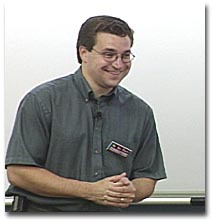Spinning wheels...
 Too much spinning can make you dizzy, and you wind up throwing up on your customer base.
Too much spinning can make you dizzy, and you wind up throwing up on your customer base.
DaimlerChrysler is reporting that the feds are calling for the recall of more than 600,000 Dodge Dakotas and Durangos.
NHTSA is making the recommendation after investigating reports of upper ball joint separation on dozens of vehicles. When that joint separates, the suspension can collapse and the wheel can fall off.
 Those reports are tied into causing a number of accidents, but no injuries.
Those reports are tied into causing a number of accidents, but no injuries.
Now, as a spokesperson, it's important to put the best face on a situation. DaimlerChrysler spokesman Max Gates was quoted this way in the New York Times:
"We don't think a recall is appropriate," Mr. Gates said. "We haven't had any serious injuries or fatalities. We've been saying this is not a safety defect."As a driver, that would make me feel more secure. As a DaimlerChrysler stockholder, I'd feel more secure if Mr. Gates didn't leave himself open to creative editing. Some journalists will latch onto parts of your statement if you are not careful. Like in this Associated Press brief that hit dozens of television news sites, like this one:
CBS News first reported the request for a recall.
The traffic agency could force the company to recall the trucks, but that process could take years and could potentially be delayed by litigation.
Mr. Gates said the problems with the trucks generally occurred at low speeds during turns. He also said most drivers would have advance warnings of a potential problem because of excessive tire wear or unusual noises coming from the front of the trucks.
The company spokesman says it does not think "it rises to the level of a safety defect."Wow. Big difference. And there's no context to let you know that Gates has a point, instead of just blowing smoke.
How do you avoid this? It's real tricky. Proactive techniques work with regular beat writers and producers, where you get a chance to explain the connection in a way they will understand. Lacking that opportunity, you need to phrase things differently, so the "juicy" part of the quote is harder to remove from its context:
"For this to be a real safety issue, wheels would be falling off without warning or at high speeds -- and there's no recorded instance of that. Most drivers were alerted by unusual front-end noise, or tire wear."
That was just from the top of my head. It's not perfect, but it demonstrates some principles in the war of words:
- The potentially damaging phrase is placed within a dependent clause. "We've been saying this is not a safety defect" can stand alone as an independent sentence. It is harder to take your phrase out of context when it is clearly dependent upon surrounding words for meaning.
- The potentially damaging phrase is shrouded in the cloak of possibility. "Wheels would be falling off at high speeds." Now, the recall is cast as a precautionary probability, instead of avoiding a certain doom. Subliminal in effect, yet very effective. The glass is mostly full.
- The potentially damaging phrase is couched along with advice to drivers about what to look for. If I was a Dodge driver, and I heard that wheels were falling off, I'd be livid. If I knew there were a couple of easy things to check, I'd feel better about staying on the road until time for the recall repair. Because of the construction of that short paragraph, the information I would want is right there.


 From time to time, we'll highlight the good and the bad in the world of public relations -- including an analysis of missed opportunities to do better. We'll discuss some of the strategies that were used (or
From time to time, we'll highlight the good and the bad in the world of public relations -- including an analysis of missed opportunities to do better. We'll discuss some of the strategies that were used (or 

0 Comments:
Your two cents...
<< Home